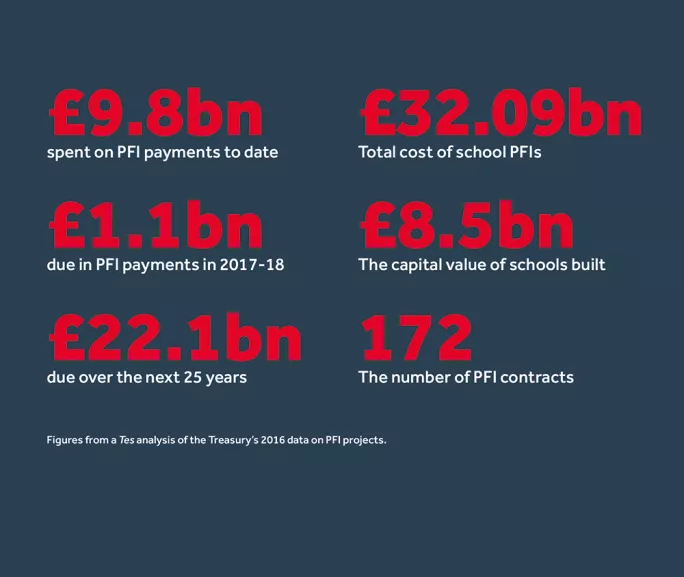£8K for a blind, £2K for a tap: the true cost of PFI

Some schools appear to be spending money like it is going out of fashion, apparently oblivious to funding cuts - paying thousands of pounds more than they should for everyday items.
From spending in excess of £8,000 for a blind for one room, to paying more than £2,000 for a sink or an outside tap, money - it would seem - is no object.
However, the vast amounts being spent on overpriced goods and services are not, in fact, the result of profligacy - and there is no element of choice, a Tes investigation reveals.
Schools are being forced to pay enormous premiums for services and items they could buy for a fraction of the amounts they are being charged, because they are locked into expensive and inflexible private finance initiative (PFI) contracts. The debt burden that comes with the deals means that getting rid of staff may be the only way they can satisfy government demands to make efficiency savings.
In some cases, schools are seeing more than 15 per cent of their budget swallowed up by PFI payments - fixed costs that heads have no control over and that are set to rise over time.
For some schools, even getting the gates open to allow children to use the toilet before a school trip is a costly exercise.
One secondary in Oldham - Newman RC College - was charged £48 after security opened the school to allow pupils to visit the lavatory. The same school had to pay more than £400 for caretakers to fit some notice boards, documents obtained by campaign group The People vs PFI show.
Such charges are not unusual. Tim Gilson, the head at Malmesbury School, in Wiltshire, says: “We had some benching put in the canteen, just along one wall, about 20 yards. We have to pay about £40 a month for the facilities management cost of that bench, on top of the cost of putting that bench in and all the materials. It’s a monthly charge that continues for the length of the contract.”
With 13 years left on his school’s PFI contract, the secondary will be charged £6,240 just for the management of the bench.
Decades of payments
PFI is a way of funding government spending by using the private sector to provide the money up front.
Investors make profits from contracts which run for decades and result in schools costing several times what they are actually worth.
Companies make money from not only charging interest on repayments, but also from schools paying for services such as security, cleaning and maintenance, in yearly payments called unitary charges.
Anything that falls outside of the contract, such as a school wanting to get an additional fire extinguisher or change the use of a room, typically results in extra charges.
This month brought the start of the new financial year, with more than £1 billion needed to pay the annual bill for school PFI debt in England alone.
A Tes analysis of the latest Treasury data for PFI projects reveals that the total school PFI bill for England will end up being more than £32 billion over the life of the contracts - at least £22 billion of which will need to be paid off over the next 25 years.

Around 40 per cent of the annual unitary charge goes on repaying the actual debt and interest on it, with the remainder going on service contracts, according to the National Audit Office (NAO).
Some schools are charged prohibitive sums for simple things like fitting a sink or installing storage cupboards.
In what are dubbed “life-cycle costs”, schools are charged over the duration of the contract, which results in even modest monthly payments mounting up over the years.
One teacher, who asks not to be named, cites an example: “We are a PFI school with an annual PFI bill of £132,478. We have been paying £88 [a year] for the installation of a new sink for 14 years now. With nine years left on the PFI contact, that sink will cost £2,024.”
At Bristol Metropolitan Academy, a single blind for a room will end up costing £8,154 under PFI. Oasis Academy Brislington, also in the Bristol area, will pay £2,211 for an external water tap over the course of a contract.
Other charges on PFI accounts for a number of schools in Bristol, obtained by Bristol Cable, include a hexagonal desk that will end up costing £2,384.29 in the years to come, and a VGA cable, normally a low-cost item, that will cost more than £500.
Stella Creasy, Labour MP for Walthamstow, in north-east London, accuses the companies that profit from financing PFI deals of being the “legal loan sharks of the public sector”, and wants an inquiry into PFI “before even more schools and hospitals are saddled with debts they can’t pay”.
Jenny Smith, headteacher of the Frederick Bremer Secondary School in Walthamstow, says: “Our PFI costs are already prohibitively high at about 16.7 per cent of our budget. These are fixed costs and cannot be reduced.
“Over the next three years we are facing real-term cuts to our budget of over £800,000, and that does not include PFI increases. Obviously, this is completely unviable for the future of the school.”
Budget pressure
Some schools with PFI contracts are being hit with a “triple whammy” when counting losses under the national schools funding formula and the savings schools are expected to make, according to Meg Hillier, chair of the Public Accounts Select Committee.
The Labour MP says: “The government has not fully understood the interaction of existing PFI deals that people are tied into and the demands that [ministers] are making for £3 billion in efficiency savings.
“This is just another example of the lack of grip by the Department for Education on the reality for schools on the ground who are trying to sort out their budgets.”
Councils are concerned that PFI contracts “impose a cost burden which is not transparent and which puts profit ahead of educational considerations”, according to Richard Watts, chair of the Local Government Association’s Children and Young People Board.
Labour shadow education secretary Angela Rayner sees the impact of PFI debt as a “serious problem for many schools, especially at a time when the government are imposing the first cuts to school budgets in a generation”.
More funding is needed to help schools trapped in PFI contracts, according to Julia Harnden, a funding expert at the Association of School and College Leaders. “We are concerned that the current level of funding to the education sector is inadequate both for this purpose and in general. It needs to be improved as a matter of urgency,” she says.
A Department for Education spokesperson says: “We have recently consulted on a new, fairer national funding formula for schools, into which PFI costs are be taken into consideration.”
“Including a PFI factor in this formula recognises these costs in how funding is allocated across the country, for the first time. This will, we believe, mean a fairer outcome for schools in areas with PFI commitments.”
But although funds will be allocated on the basis of historic spend and to take account of inflation in the short term, officials have yet to decide on the longer term approach.
In the meantime, PFI schools will continue to be trapped in legally binding contracts that make it virtually impossible for them to save on costs relating to the physical aspects of schools - meaning the only significant savings they can make are in laying off staff.
Martin Gaskin, a chartered accountant and former PFI school governor, warns that schools will choose PFI over keeping teachers: “The unitary charge is contractual, fixed and inescapable and will be paid ahead of the staff costs: governors and heads will feel legally that they have no choice.”
You need a Tes subscription to read this article
Subscribe now to read this article and get other subscriber-only content:
- Unlimited access to all Tes magazine content
- Exclusive subscriber-only stories
- Award-winning email newsletters
Already a subscriber? Log in
You need a subscription to read this article
Subscribe now to read this article and get other subscriber-only content, including:
- Unlimited access to all Tes magazine content
- Exclusive subscriber-only stories
- Award-winning email newsletters